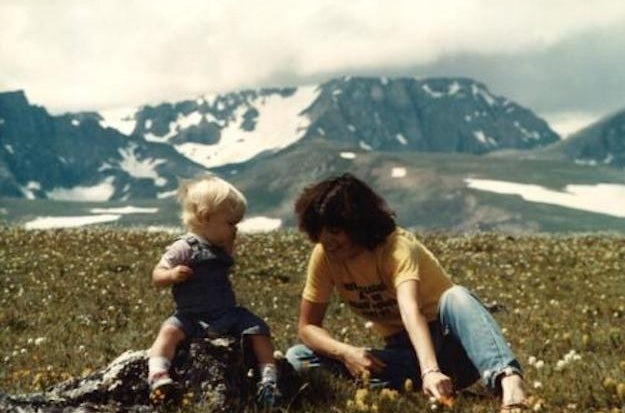
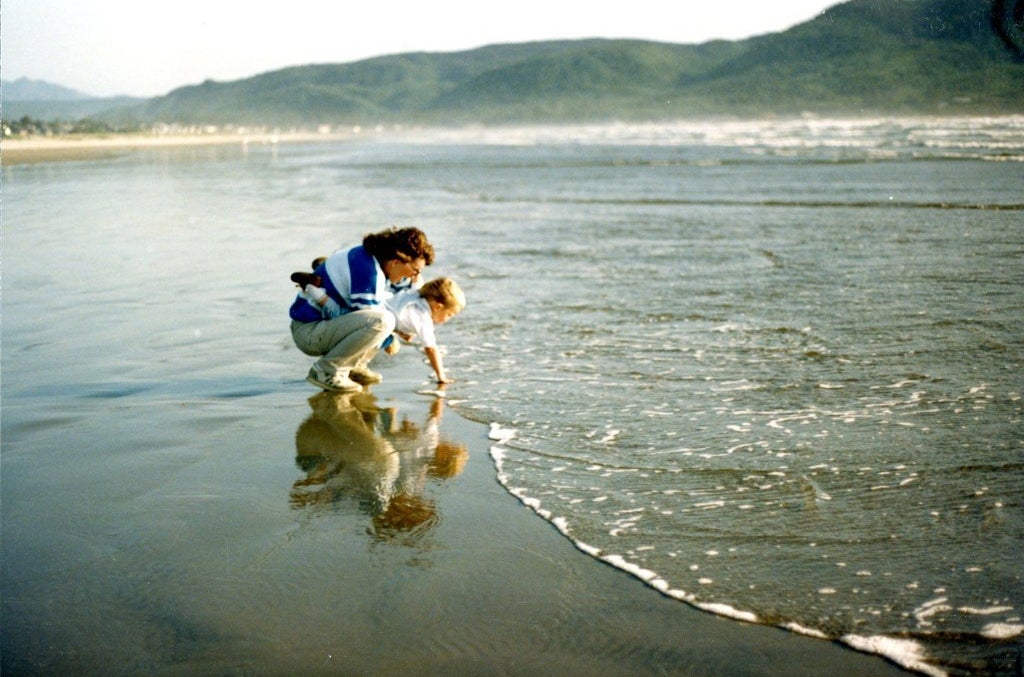
The story I’ve always told myself and others about my mom is relatively straightforward: She could’ve been a scientist. She was a chemistry star. She would’ve gone to grad school, if she hadn’t gotten married to my father a month after graduating from college in 1978. A number of subsequent events — including a diagnosis of endometriosis — led to my birth when my mom was 24, and my brother's three years later. She worked while my dad went to medical school. When my family moved to small-town Idaho, where my father started his medical practice, she was a stay-at-home mom. She was furiously bored, but loved us dearly. She was an agitator for better schooling conditions. She had a wonderful set of friends. She took classes at the local college, where she eventually began teaching math as an adjunct professor. Then my dad left, and her life disassembled itself.
She didn’t have a full-time job or anything resembling a career. She was frightened: that my brother and I would somehow leave to live with my dad, for her financial future, about whether or not she’d find love again. She made decisions to preserve her family and herself that have had long-standing consequences, including dreams deferred or extinguished altogether.
This both is and is not the way that my mother would tell the story. Some parts are indisputable: My mom stayed home from work; my father left our family. Others I’ve heard her describe in hindsight: “Your dad left and I was scared.” But the connective tissue that binds these events, that’s at least in part my doing. It's become the story I tell myself of my mom’s life — and, over the last 10 years, an implicit explanation for the way I’ve lived mine. Why, in other words, I’ve deprioritized marriage, prioritized my career, and, at age 33, find myself profoundly ambivalent about the prospect of children.
When I said a few things to that effect on Twitter, my mom was understandably frustrated. She told me I was mapping my own understanding onto her life and decisions — and for an audience of thousands. “You’ve taken the control of my image, as a mother, away from me,” she wrote.
She wasn’t wrong. But I kept thinking about the immediate and intense way other daughters of boomer-age mothers responded to my initial tweets. So I've asked daughters to tell the wide-ranging stories of how their mothers’ choices have influenced their own — and asked their mothers to tell the stories of their lives and how they see their choices reflected in the lives of their daughters.
These mothers were participants in or beneficiaries of feminism’s second wave — both liberated by expanding freedoms for women and hindered by contradictory expectations of how a woman could manage a career and motherhood and agency over her own life. Most had no models for how to do so, and struggled accordingly.
We daughters are the second generation to deal with these freedoms. We have the benefit of our mothers' examples; we can be appreciative of their struggles and unfairly critical of their failures. Ultimately, maybe the fairest thing we can do, as we tell ourselves and others of the ways our mothers have influenced our lives, is to include them in the conversation.
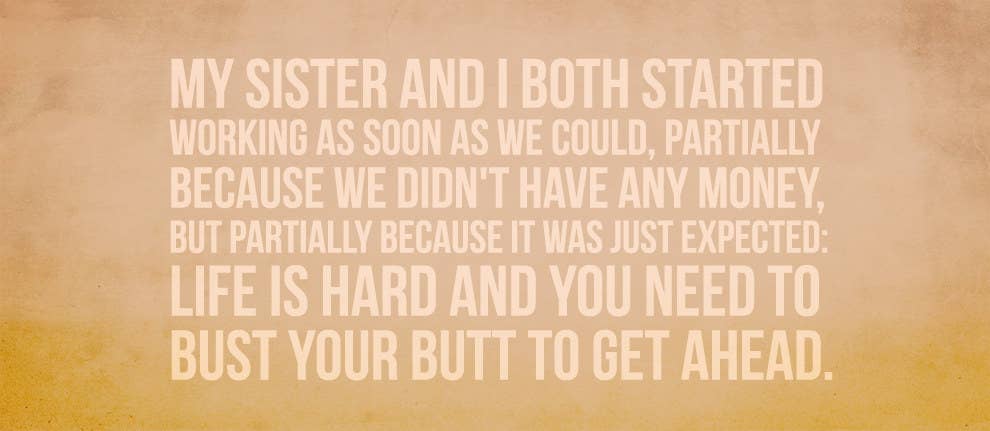
DAUGHTER (41, white, grew up “poor as heck!” in Minnesota): My mom was a single parent of two — our dad left shortly after my sister was born, and she really struggled to raise us, because she wasn't working at the time. My sister and I both started working as soon as we could, partially because we didn't have any money, but partially because it was just expected: Life is HARD and you need to bust your butt to get ahead. I'm now married with two kids, and my husband's a stay-at-home dad. I would NEVER not work...I would be too worried about my own financial stability.
MOTHER: I went to a private college, moved to Chicago and then California to teach, traveled, had many adventures, deepened my commitment to working with the poor (teaching in inner cities), and at 25 decided I was ready to settle down — it helped that I was swept off my feet by a dashing young man. We decided almost immediately that we wanted children (we were of course married by that time — part of the order of things) and at 28 (which seemed very old and mature at the time) I had my first daughter. We ended up in northern Minnesota, my home base, where after two years and another child, he deserted us all.
At that point, it became necessary for me to work pretty consistently, despite welfare, parental support, and a relatively low cost of living. We had good times, at least as I remember. I taught Sunday School, led their scout troop, took them to dance and sports and gymnastics and art and piano lessons. We made piñatas for holidays, cooked holiday dinners for the entire extended family, and were a pretty complete family.
I believe most of what they learned about work-life balance they learned from my example rather than my words. When they were both in their early twenties, I asked THEM what they were proudest of so far in life — expecting it to be scholarships, jobs, prizes, etc. They put their heads together and came up with, "We were never arrested, and we didn't have children before we got married!"
I was astonished. I guess those had been values I had for them, but I was prouder of their much larger, to me, accomplishments. When I asked what they had learned from me (expecting, I guess, how to cook or drive) they agreed that I had showed them how grown-ups go to work every day no matter what.
Both girls have married, had children, and work long, demanding hours at times. They handle it with grace and joy, especially the child-rearing parts. They have leadership roles in their children's activities and have taught them many valuable lessons, including how to win and lose graciously, how to value education and learn about everything. I have wonderful grandchildren who remind me of their mothers.
I'm very happy with the order my life has taken — I have had time for the things I wanted to do — I never felt that tug of "If only I could have..." Life is too short to do everything we would have liked, but I am just retiring and feel there will be time to do more. Like most parents, I wish life could be completely problem-free for my children, even as I know that real growth comes from facing struggles. My biggest regrets would be that I had issues with addiction that may have impacted their adolescence. We survived it intact, and are perhaps all stronger for it. Still, none of it was fun for any of us.
I think my daughter has learned a lot of the basic values — the value of family, the value of work, education, the need to take responsibility and leadership in groups and around things that are important — from watching me conduct my life and care for them.
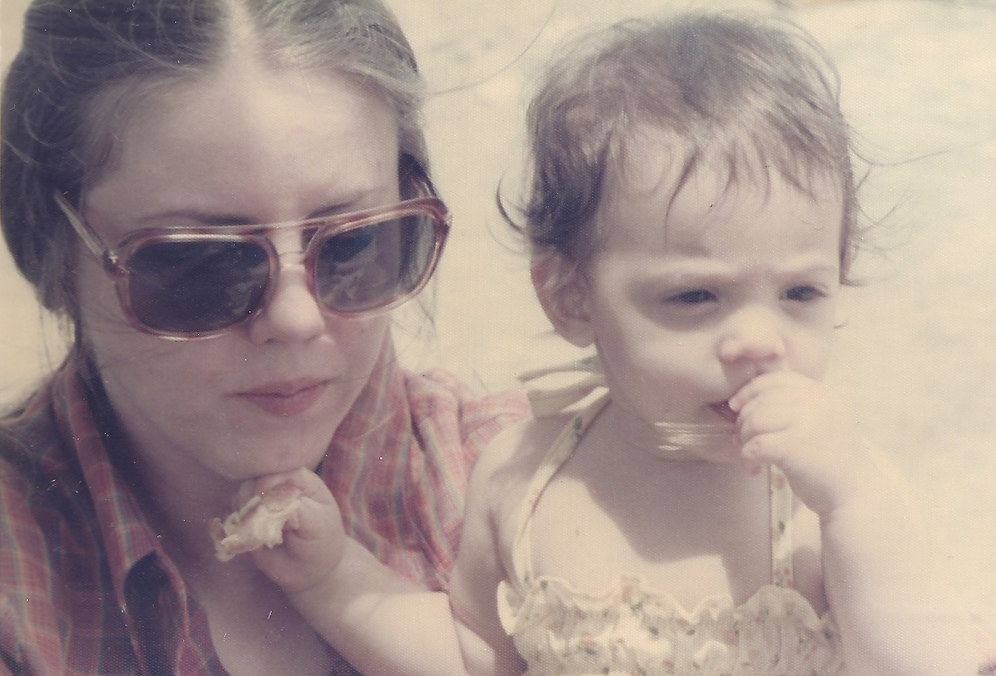
DAUGHTER (Arab-American, 38, middle class, grew up in Saudi Arabia): My mother made some really bold choices in her life, like leaving her home at 18, moving to the big city (something that no one in her family did), and marrying a foreigner and moving abroad for 20 years. But she did ultimately live a very traditional stay-at-home mother role.
Both of my parents always encouraged me to go to college, have a profession, and then get married/have kids if I wanted. I have to admit that, although I have a lot of respect for the amount of work my mother did in her stay-at-home role, many of her daily tasks reinforced in me the desire *not* to have the same life when I grew up. I still refuse to do my husband's laundry — something my mother did exclusively.
At 38, I’m going back to school this fall to seek a second master's degree after deciding to change careers. Something about my aversion to having a traditional role definitely played into both my desire to change careers and my feeling that I can and should be free to do so (not to mention that supportive partner that I have in my husband). I do love (LOVE) being a mother, though. It’s a strong part of my identity, and with two daughters I think every day about being a model for them: I want them to know that they are lucky to live in a time and place that allows them to be who they are, whether that makes them traditional, modern, or a mix of the two.
MOTHER: I know I tried to be as independent as I could be and I feel that I was successful to a certain extent while still living in Saudi Arabia — it was important to me that I model that for my daughter, especially with the two cultures in our home. I was in charge of our household finances, which was unusual at that time and in that context. Even though I was a stay-at-home mom, I did a lot of multitasking, and I think she caught on to some of that just by observing me.
We had access to a good library. We went there often and she read a lot, so I think that helped her curiosity and helped her become a lifelong learner. I read a lot too, and I wanted her to see that I did. Library trips were one way I reinforced the value of education in her.
This was everything that I didn't have as a child.
Her father didn't want me to teach her to cook because he wanted to make sure she didn't feel relegated to that role that so many girls and women around her had.
We were multicultural, so different factors came into play at different times. But one of the biggest things for her and her brother was to make your own choices and find your own way. Growing up, I was more independent than a lot of my siblings, so that came through in my parenting. I think she is a problem solver today, and I like to think I helped her develop that skill.
But the boomers are all sort of an off generation in some ways, not bending to all the rules of society. I think that suited me because I didn't want to follow the rules and I wanted to make some of my own too. The rest of my siblings pretty much stayed close to home. I wanted to see the world.
That's the spirit that laid the foundation for my parenting choices, but those choices were still limited to some degree because we were living in a conservative society that had many rules that absolutely could not be broken.
I like to think that education was a top priority for her and that we made sure she would feel free to make her own choices without someone else trying to determine her future for her. I didn't have those choices, or maybe I did but didn't make them.
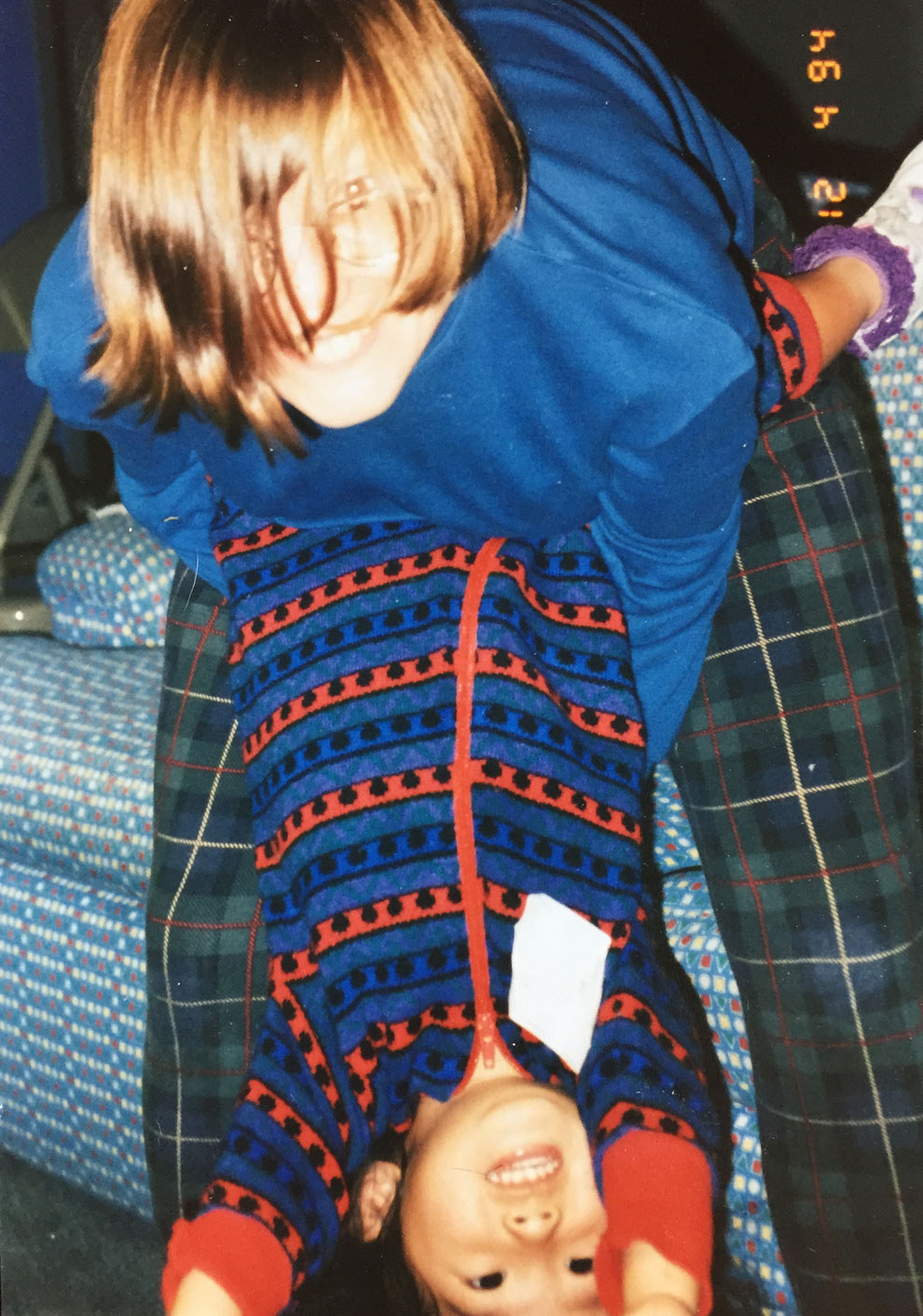
DAUGHTER (Chinese, 22, upper class, grew up "everywhere"): My mom married and had kids late. She always expected me to get at least a college degree, if not a graduate one. She generally supports my life decisions if they seem in service of eventual academic/career success. I am, in some ways, following in her tracks: top grades in school, lots of academic success. However, I place a different amount of emphasis on a career, perhaps because I have the luxury of not having to pay off student loans. I see a career as an eventuality but not as an immediate necessity. As for children/marriage, I don't know if I even want to do those things — especially marriage. I know that my mother would have been lonely not marrying and having four children (two adopted, two biological). I also know that she would have been even more successful than she is now.
MOTHER: I would like to think that having a mom who has worked hard at a career, and devoted efforts to causes I'm passionate about, has contributed to my daughter’s work ethic, and also her desire to do something fulfilling and worthwhile. On the other hand, maybe she resents that I always worked. That's for her to decide and think about as she makes her own choices. As for family, again, I could only do what I thought was right.
I grew up an only child, and lost both parents at a young age. I really didn't want my own kids to have that experience. My daugher may or may not appreciate having three siblings, and maybe she never will (I don't know), but I was influenced by my own family experience in wanting her and her siblings to have each other for life. She may have different personalities, go her own directions, but I hope they will all be able to count on each other, always. Most of all, I hope she realizes how much I truly love her and her three siblings, and how I have enjoyed being a parent so much more than anything else I've ever done. I can only hope that has come through to her.
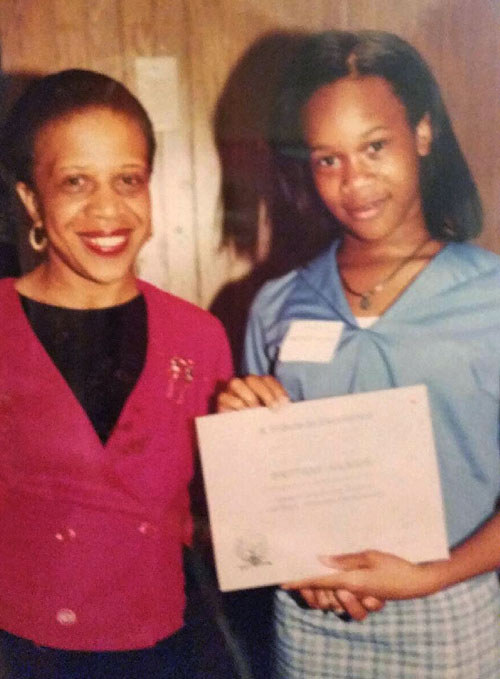
DAUGHTER (black, 27, grew up middle-class in Chicago): My mother was a strong example for my sister and me. She got married later for her generation (late twenties) and had my sister and me around ages 30 and 33. She also proved that an education, pursuing her career, and mothering were not mutually exclusive ideas. She maintained all three, ultimately getting two graduate degrees, teaching full time, and actually being involved. I think she taught my sister and me that hard work is a given, not a choice. Whether it was because of who she is or what she knew she would face and what we would face being black in America, she made sure we understood it was ALL possible and that pursuing one over the other would never be the sort of choice afforded to us. It's always been what we've had to do.
MOTHER: My daughter has seen the things I’ve done, but I don’t think she’s following what I’ve done as a mother; I think she's doing it her way. She’s seen what choices I’ve made and she thought those were positive, but I think she’s also seen that I’ve done some things that maybe she wants to do more of so she'll have more choices.
She knows that I have been limited for obvious reasons – or I may have limited myself...for...you know – but I think she’s gone out and done things looking at the choices I’ve made. I think I’ve given her a lot of opportunities. I’ve given her a lot of choices she can make as a mother. I think I’ve left it open to her. I haven’t said, “Oh, you can only do this.” I haven’t limited her to anything. I think I’ve opened her to many things and I think she’s made choices on her own. What churches we went to, the different little things we’ve gone to. I’ve never said, “Oh, we’re gonna be this. We’re gonna do this.” She’s made her own choices. The different sports. The different interests. You wanna write, you can write. You wanna dance, you can dance. You wanna sing, you can sing. You can do them. It's work, but yes, you can. These are the choices I’ve given her.
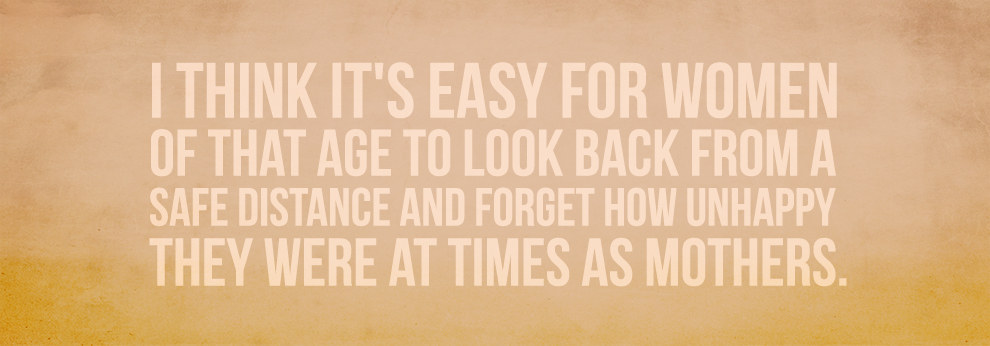
DAUGHTER: (34, white, grew up upper-middle-class in Wyoming): There were times when my mom seemed very frustrated. She got married at 19 and had her first child (my older sister) at 25. She and my dad lived in the same small town they grew up in and never left. She stayed home with us kids until we were in school, and I think that was a difficult time for her. She opened her own restaurant once we started school and did really well with it, but I know she feels a lot of guilt for not always being fully available to us kids. We kids don't feel like that, but she still has guilt.
When we were in high school she sold the business and went back to college, eventually getting an associate's degree. She now works as a school librarian and loves her job. I know she put off a lot of the things she wanted to do in life (college) or compromised on them (career) because she had kids. I always swore that would not be me. Even as a little kid I knew I didn't want to be tied down like that with marriage and kids. I wanted to travel and live in other places and meet new people. I couldn't wait to be independent and go to college and get the heck out of Wyoming.
Now that I'm older she and her friends talk to me a lot about how they wish they had taken more time for themselves before getting married and having kids. They see my independence and all the great things I've been able to do in my career and wish that they had been able to experience that too. They've expressed frustration at always being seen as "wife of" and "mother of" rather than just as themselves.
Although I will say that as soon as I hit 30 it went from "Enjoy your youth and independence! Don't get tied down!" to "You need a husband! You will live to regret the emptiness of your life without kids!" I'm in a serious relationship and could see myself getting married, but I don't think that kids are for me. I think it's easy for women of that age to look back from a safe distance and forget how unhappy they were at times as mothers. Now they see it as their defining characteristic and they want to be able to participate when their friends are bragging about grandchildren.
Although there's a LOT of pressure from my mom and her friends, I just don't feel like kids are something I want to do. And maybe there will be some moments of regret. If I have kids I want to be fully committed to them, and right now I don't feel like that's a commitment I'm capable of making (or willing to make). I love my mom and I think she was and is a good mom, but she has a very limited view on what makes a life fulfilling, namely being a wife and mother.
MOTHER: I did feel fulfilled being a mother. I loved it. It was hard work but so worthwhile, and I kind of felt I was good at it. But there were times, especially at social gatherings, when I would feel "lesser" than some of the women I visited with who were finishing their degrees or had exciting jobs outside the home. And then as the children got older I felt like I needed to think about what I was ultimately going to do with my life.
If I could go back I'd still get married to this same wonderful man (no regrets there), but we'd find a way to get through school too. We didn't start a family until we'd been married for six years, so we definitely weren't in any rush in that department. We could have found a way. He eventually did go back and get both bachelor's and master's degrees while I helped support us by starting the pizza/sub business that I owned for nine years. And then later I went back part-time and got an associate's degree. But by then I was 50 and didn't really want to commute 120 miles to finish up my bachelor's. I got a job in the library of a middle school (which I love) and am about to retire in May.
I do feel that my daughter made some life decisions based on what she's seen and heard from me. I always stressed the importance of a college education/degree, and I wasn't shy about letting my feelings of regret about not getting one be known to her. It was just expected in our house, and from an early age our children knew it wasn't going to be handed to them. They had to get good grades and scholarships. And she did.
My husband and I made no secret of the fact that we were too young at 19 to have made such a decision and drop out of college. The odds were definitely against us that it would work out. But I think the reason she hasn't married is because she just hasn't met the "one" yet and won't settle for less. I never was one to believe you had to be married to be happy. But we did talk about her getting a master's degree and how that would help her to be independent and open a lot more doors to her. And if she someday wanted children, she would be better able to support that choice. We talked a lot about order and how life just seems to work better when it's observed in the context of achieving goals, whether it's a good education, a solid marriage, planned-for children, or fulfilling careers.
For myself, I'm proud of how my life has turned out in spite of the few regrets. I have a good marriage. Together we've worked very hard through the years making our present and future financially secure. I'm very hopeful that retirement is going to be wonderful. I'm proud of the job I did as a parent because I have three happy, well-adjusted children. Like most parents, I could have done some things better, but I believe I did the best I could. I'm proud that in my job I've tried to make children fall in love with reading. And though I never went back and finished that degree, I believe I have never stopped learning. Again, being a librarian helped.
So much of what my daughter has achieved she has done by her own sense of who she wants to be. She has experienced things in her life (good and bad) that have shaped her in ways I never could have. And she has pushed herself in ways I never would have. Maybe it's generational. I went "further" than my mother, and my daughter is going "further" than me. I'm in awe of her in so many ways, and I have so much hope that whatever she wants out of life she can get it.
Author's Note: These responses were selected from over 700 accumulated through a survey distributed across the United States, which is part of a larger project collecting and distributing stories of mothers and their daughters. You can still contribute here, and look for more stories in the weeks to come.
